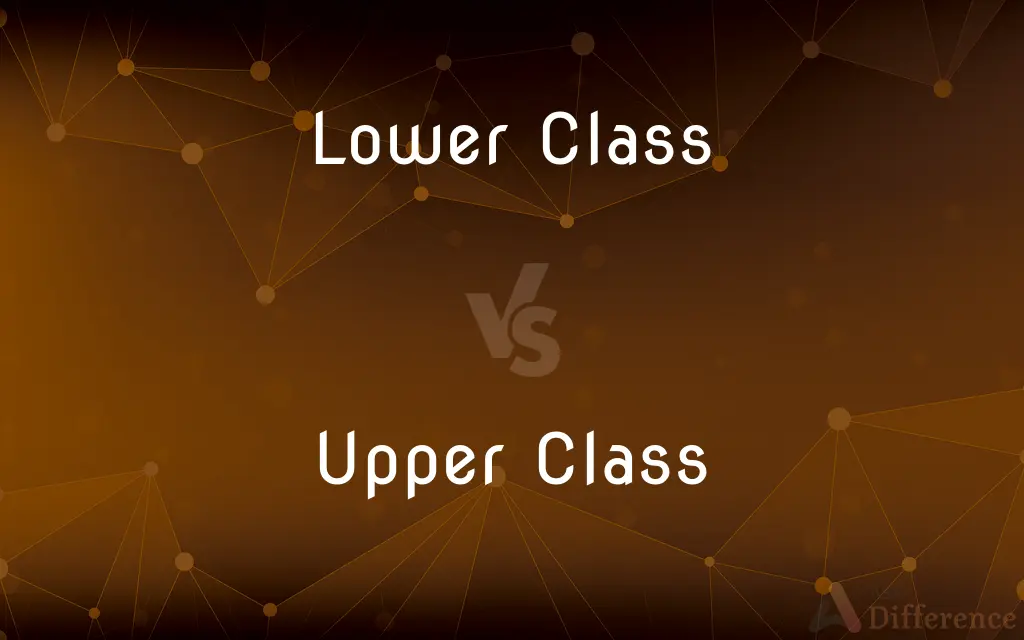Lower Class vs. Upper Class — What's the Difference?
By Tayyaba Rehman & Urooj Arif — Published on February 2, 2024
Lower Class refers to the socioeconomic group with lower income and limited resources, while Upper Class denotes the wealthy, high-income group with abundant resources.

Difference Between Lower Class and Upper Class
Table of Contents
ADVERTISEMENT
Key Differences
The Lower Class typically includes individuals with lower income levels, often working in unskilled or semi-skilled jobs. They may struggle with financial insecurity and have limited access to healthcare, education, and other resources. Conversely, the Upper Class consists of individuals with high income and wealth, often holding influential positions in society and enjoying a higher standard of living. They have access to premium healthcare, education, and exclusive social circles.
In terms of lifestyle, the Lower Class often faces challenges in meeting basic needs and may live in less affluent neighborhoods. They might have limited access to leisure activities and travel due to financial constraints. The Upper Class, on the other hand, often lives in affluent areas, enjoys luxury goods and services, and has the means for extensive travel and leisure activities. Their lifestyle is marked by comfort and extravagance.
Educationally, members of the Lower Class may have limited access to higher education due to financial barriers and often attend public schools. This can impact their long-term career opportunities and income potential. In contrast, the Upper Class typically has access to prestigious educational institutions, often through private schooling, and they have a higher likelihood of obtaining advanced degrees, leading to lucrative career paths.
Socially and culturally, the Lower Class may experience marginalization and have less influence in societal decisions and policies. Their cultural practices might be less visible in mainstream media. The Upper Class, with its significant social and economic influence, often plays a major role in shaping culture, politics, and media, holding power in societal discourse and decision-making.
The Lower Class and Upper Class experience different levels of societal privilege and power. The Lower Class often faces systemic barriers and discrimination, impacting their overall quality of life and opportunities. The Upper Class, however, typically benefits from societal structures that favor their economic and social status, granting them considerable privilege and influence in various aspects of society.
ADVERTISEMENT
Comparison Chart
Income Level
Lower income
High income
Lifestyle
Basic, with financial constraints
Luxurious, with abundant resources
Education
Often limited access to higher education
Access to prestigious educational institutions
Social Influence
Less influence in society
Significant influence in society
Living Conditions
Less affluent neighborhoods
Affluent areas and homes
Compare with Definitions
Lower Class
Lower Class members often face challenges in accessing quality healthcare and education.
The Lower Class struggles with the rising costs of healthcare and education.
Upper Class
Members of the Upper Class typically hold influential positions in business or society.
Upper Class individuals are often found in executive roles or as business owners.
Lower Class
In society, the Lower Class typically has less political and social influence.
The Lower Class is often underrepresented in political decision-making.
Upper Class
In society, the Upper Class wields significant economic and political power.
The Upper Class plays a key role in shaping national economic policies.
Lower Class
The Lower Class experiences higher rates of economic and social vulnerability.
Economic downturns disproportionately affect the Lower Class.
Upper Class
Upper Class lifestyle includes high-end leisure activities and travel.
The Upper Class often vacations in exclusive resorts around the world.
Lower Class
Lower Class refers to a socioeconomic group with limited financial resources.
Families in the Lower Class often rely on community assistance programs.
Upper Class
Upper Class refers to the wealthiest segment of society with abundant resources.
The Upper Class often invests in luxury real estate and high-end vehicles.
Lower Class
The Lower Class includes individuals in unskilled or low-paying jobs.
Many Lower Class workers are employed in service industries with minimal job security.
Upper Class
The Upper Class enjoys privileges like exclusive education and healthcare.
Upper Class families frequently send their children to elite private schools.
Lower Class
The socioeconomic class or classes of lower than middle rank in a society.
Upper Class
The highest socioeconomic class in a society.
Lower Class
Not of the elite, of the peasantry or working-class.
The lower-class people have little chance of advancement.
Upper Class
Of high social position
Lower Class
Unrefined.
His lower-class tastes tended to run to three-stooges movies and cheap drink.
Upper Class
Aristocratic
Lower Class
Same as low-class. Contrasted with middle-class and upper-class.
Upper Class
Occupying a socioeconomic position intermediate between those of the lower classes and the wealthy
Lower Class
Occupying the highest socioeconomic position in a society
Common Curiosities
Can individuals move between classes?
Yes, individuals can move between classes, often through education or career changes.
Are there any health disparities between classes?
Yes, there are often notable health disparities, with the Lower Class having less access to quality healthcare.
Is the Upper Class always financially stable?
While generally more financially stable, the Upper Class can also face economic challenges.
How does class affect education?
Class can significantly impact the quality and level of education one can access.
What typically defines a person's class?
Class is often defined by income level, occupation, education, and social status.
Does the Lower Class have access to the same opportunities as the Upper Class?
Generally, the Lower Class faces more barriers to opportunities than the Upper Class.
Can government policies bridge the class gap?
Effective policies can help reduce class disparities, but they cannot eliminate them entirely.
How does class impact political influence?
The Upper Class typically has more political influence and representation than the Lower Class.
Do class distinctions impact employment opportunities?
Yes, class often influences the type and quality of employment opportunities available.
How does society view the Lower Class?
Societal views vary, but the Lower Class is often stigmatized or marginalized.
How does class affect consumer behavior?
Class influences spending habits, with the Upper Class able to afford luxury goods.
Do class distinctions affect mental health?
Yes, class can impact mental health, with the Lower Class often facing more stressors.
How does class affect one's social network?
Class can influence social circles, with people often associating within their class.
Is class mobility easier in certain countries?
Class mobility varies by country, often influenced by economic and social policies.
Does the media accurately represent all classes?
Media representation can be biased, often underrepresenting the Lower Class.
Share Your Discovery

Previous Comparison
Noir vs. Neo-Noir
Next Comparison
Left Handed vs. Right HandedAuthor Spotlight
Written by
Tayyaba RehmanTayyaba Rehman is a distinguished writer, currently serving as a primary contributor to askdifference.com. As a researcher in semantics and etymology, Tayyaba's passion for the complexity of languages and their distinctions has found a perfect home on the platform. Tayyaba delves into the intricacies of language, distinguishing between commonly confused words and phrases, thereby providing clarity for readers worldwide.
Co-written by
Urooj ArifUrooj is a skilled content writer at Ask Difference, known for her exceptional ability to simplify complex topics into engaging and informative content. With a passion for research and a flair for clear, concise writing, she consistently delivers articles that resonate with our diverse audience.














































